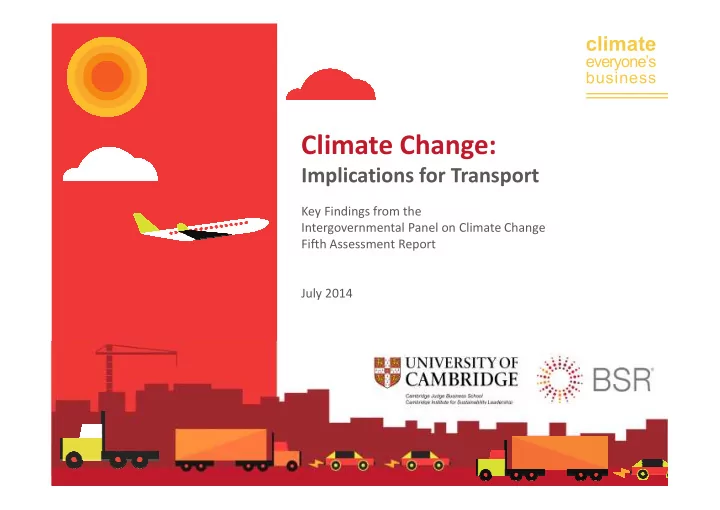

������� ����������� �������� Climate Change: Implications for Transport Key Findings from the Intergovernmental Panel on Climate Change Fifth Assessment Report July 2014
������� ����������� Climate Change: Physical Impacts �������� Climate change impacts are projected to raise global average surface temperature o C by 2100. 2.6–4.8 Physical impacts include: � More intense droughts � More intense floods � Heat waves � Thawing permafrost Climate change impacts � Rising sea-levels could require extensive adaptation and changes to Vulnerable infrastructure includes: route planning in some � Roads regions. � Railways � Ports and coastal zones
������� ����������� Climate Change: Sector Emissions �������� Transport accounts for about a quarter of global energy-related carbon emissions, rising faster than for any other energy end-use sector . Challenges facing transport emissions cuts include: � Continuing growth in demand and Without aggressive slow turnover of stock and intervention, transport infrastructure emissions could double � For some modes, suitability of by 2050 . alternative fuels with an equivalent energy intensity to fossil fuels
������� ����������� Climate Change: Resilience �������� Adapting to climate change will require higher specifications for existing transport infrastructure and awareness of projected impacts . Efficient design of urban areas and their associated transport networks will play a Companies can benefit significant role in the resilience of cities in the from understanding and future. quantifying risks to infrastructure in order to New partnerships with government and civil justify capital investment and assess supply-chain society as well as collaboration with industry risk and build resilience. and customers can advance policy solutions .
������� ����������� Climate Change: Mitigation �������� Despite a lack of progress to date, the transition required could arise from : � New technologies � Shifts in infrastructure and modes � Implementation of stringent policies � Changes in behaviour Many energy efficiency measures have a positive Energy consumption could be cut by 30–50% return on investment , and by 2030 through for example: some have a negative � Improving aerodynamics lifetime cost . � Cutting vehicles’ weight � Bringing engines up to leading-edge standards � Viable alternatives replacing petrol and diesel
������� ����������� Climate Change: Co-Benefits �������� Efficient, low-carbon transport systems have significant co-benefits , including: � Better access to mobility services � Time savings � Energy security � Reduced urban pollution � Better health Integrated, far-sighted planning can create resilient low-carbon transport networks , particularly in new urban areas. Planning is Benefits can offset a priority at onset to create ‘resilient cities.’ most if not all of the mitigation costs .
For more information: Cambridge Institute for Sustainability Leadership ipcc@cisl.cam.ac.uk Angie Farrag-Thibault, BSR afarrag-thibault@bsr.org European Climate Foundation AR5@europeanclimate.org www.cisl.cam.ac.uk/ipcc www.bsr.org www.europeanclimate.org
Recommend
More recommend